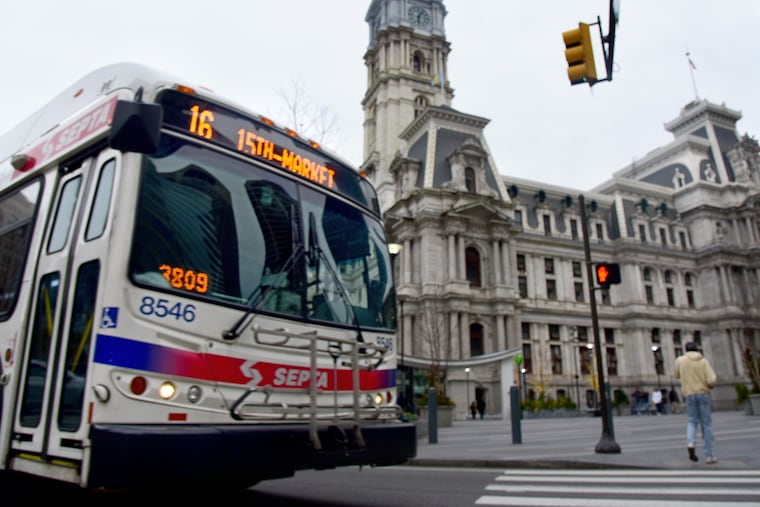Leading by exemption? Philly carves government offices out of city’s ban on cashless stores.
The Municipal Services Building in Center City will accept cash, but satellite offices for the Revenue, Water, and Licensing & Inspections Departments would still take only checks or money orders.

Philadelphia’s first-in-the-nation law banning cashless stores will force private businesses to accept cash from customers. But the city doesn’t think its government offices need to take paper bills.
Proposed regulations implementing the law would largely exempt city offices from the city’s cash requirement, so long as there’s at least one “convenient location” that accepts cash for services, fines, and fees. That convenient location for all of Philadelphia would be the Municipal Services Building in Center City, city spokesperson Lauren Cox said. Satellite offices for the Revenue, Water, and Licensing & Inspections Departments would accept checks, money orders, and credit and debit cards.
Philadelphia lawmakers who pushed for the law acknowledged that few city stores are currently “cashless,” but they argued the trend could become a problem in a city where roughly a quarter of the population is in poverty. The nation’s poorest large city became the first in the nation to ban cashless stores in February.
Advocates for the poor described the proposed carve-out for government offices as hypocritical.
“You’re asking businesses to do something you won’t do,” said Kevin Thomas Jr., of Drexel University’s Center for Hunger-Free Communities. Thomas, who backed the ban, said one location accepting cash is hardly “convenient” for everyone in the city.
State government offices selling permits, driver’s licenses, and identification cards have already said they will still refuse cash. The city can’t enforce its new ban on state entities, legal experts have said.
The Philadelphia Commission on Human Relations, the agency charged with enforcing the ban, filed the proposed regulations Aug. 9 and the law is now under a 30-day public comment period that ends Sept. 8. If no one asks for a hearing by then, the measure will take effect as is on Oct. 1. No one has asked for a hearing as of Aug. 22, Cox said.
The law was supposed to take effect July 1 after Mayor Jim Kenney signed the ordinance in February, but the city delayed implementation until October as the commission hadn’t finished drafting the regulations.
Among other things, the proposed regulations would exempt Uber, vending machines, and massage chairs from the cashless ban.
Supporters of the law say cashless stores effectively discriminate against poor consumers who do not have access to credit or bank accounts. Nearly 6 percent of residents in the Philadelphia region were unbanked in 2017 and roughly 22 percent were considered “underbanked,” according to the Federal Deposit Insurance Corp.
With the exception of some businesses, the law will prohibit most retail locations from refusing to take cash or charging cash-paying customers a higher price. Violators of the law will face fines of up to $2,000.
As technology gives consumers more ways to pay, including with their smartphones, some businesses have gone cashless to improve efficiency, reduce the risk of robbery, and avoid the hassle of handling cash.
The commission carved out city offices to accommodate satellite locations that don’t take cash, Cox said. Those centers accept personal checks and money orders, which can be purchased at post offices, banks, or retail stores, typically for a small fee. Cox said the government offices aren’t capable of accepting cash and the commission wanted to move the law along without having to overhaul entire government systems.
“Unlike a business that requires a person to have a credit or debit card in order to access the business, a person can still do business with the city in cash and checks/money orders. It’s an important distinction,” Cox said. “Even if a person was unbanked and didn’t want to come downtown, they could still pay bills in person at a satellite office using a money order.”
The cashless ban does not apply to purchases made by phone, mail, or online. It also carves out parking lots and garages, wholesale clubs, rental companies, and goods sold directly to employees. Retailers that exclusively accept mobile payments through membership programs are also exempt, a provision meant to appease Amazon, though the web giant didn’t think the language was strong enough when it lobbied to carve itself out of the law earlier this year.
The regulations would also allow retailers to bypass the ban by installing kiosks letting customers convert cash to prepaid cards, so long as the kiosks are free and easily accessible.
The Pennsylvania Restaurant & Lodging Association, which opposed the cashless ban, dismissed it as a “largely political move” that “places Philly in unenviable position of becoming even less desirable in which to do business.”
"If these types of legislation are so important, the city should lead by example and not exemption.” said John Longstreet, president and chief executive of the trade group.
Councilman Bill Greenlee, the law’s primary sponsor, has said the city should take cash. He could not be reached for comment Wednesday. A spokesperson said he’s in Poland.